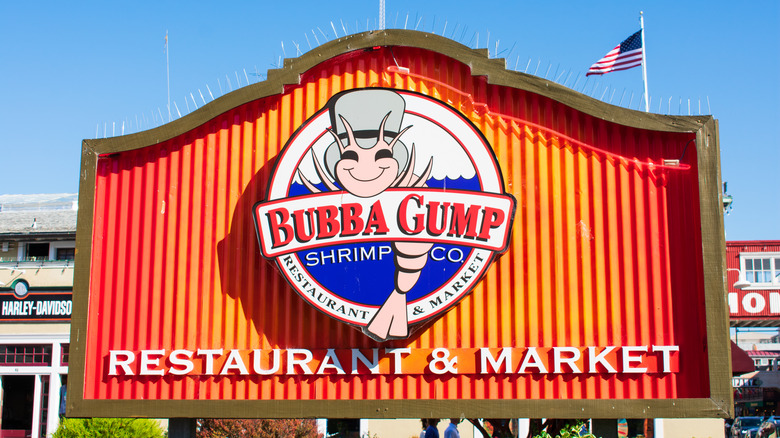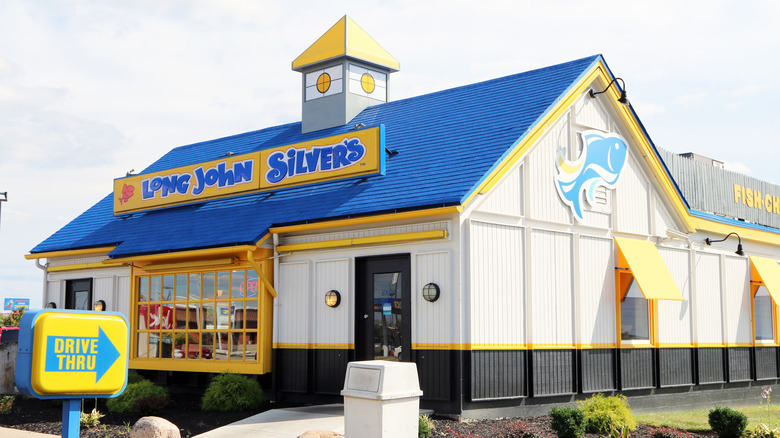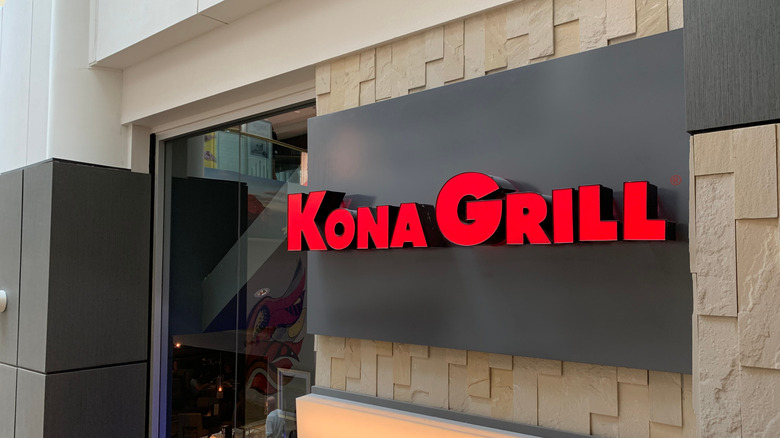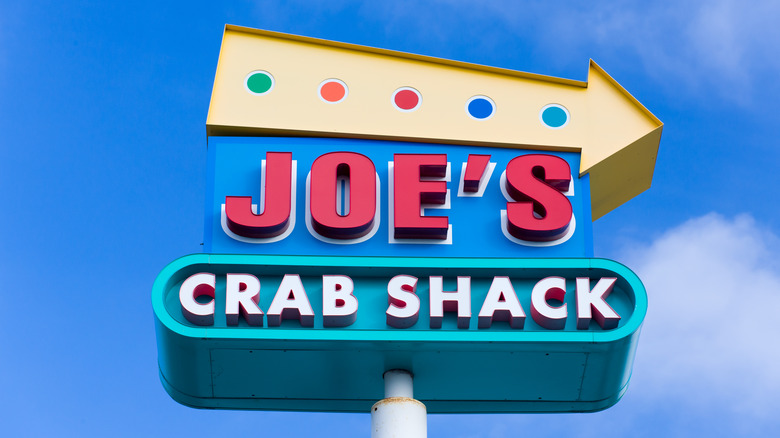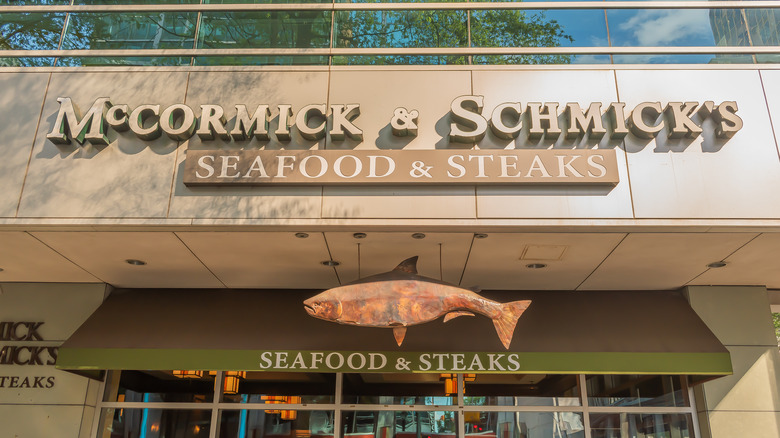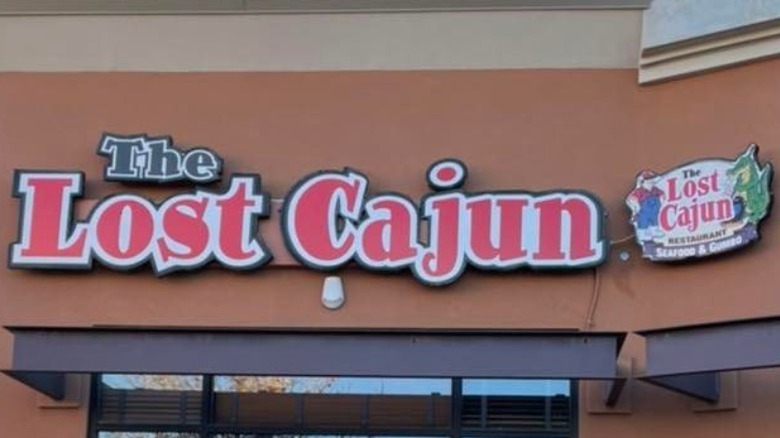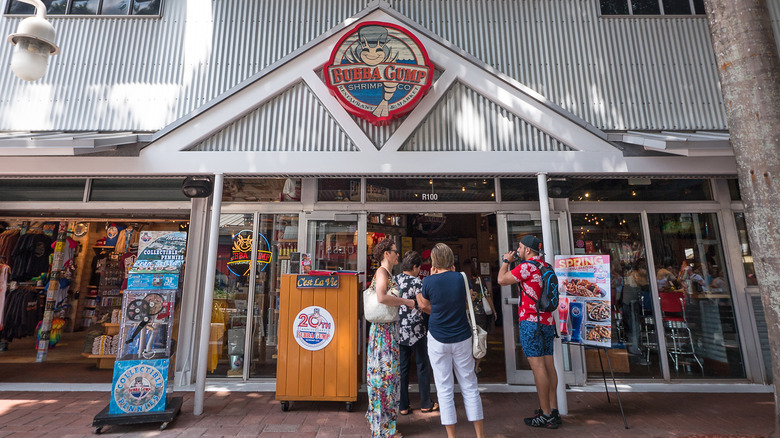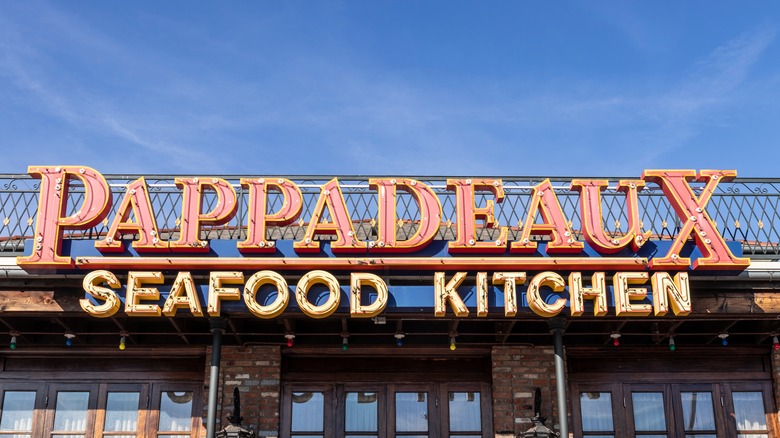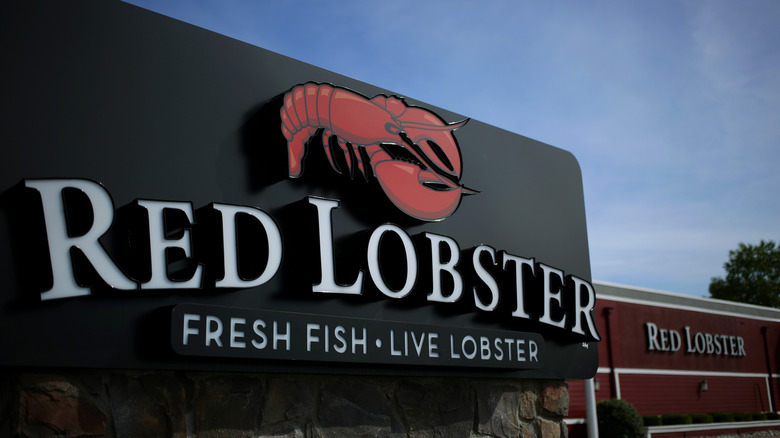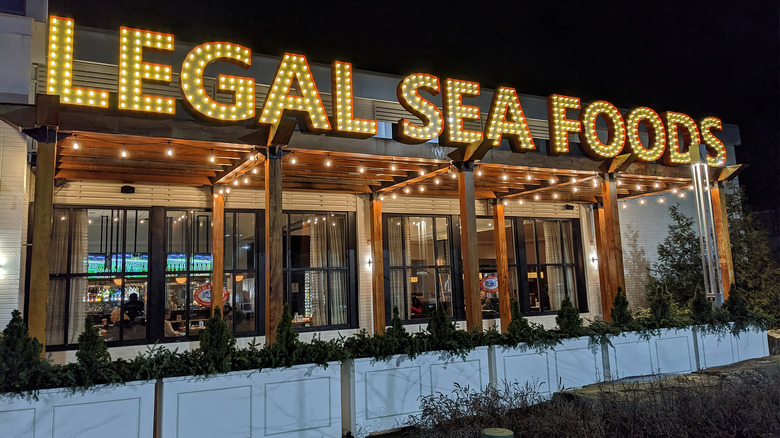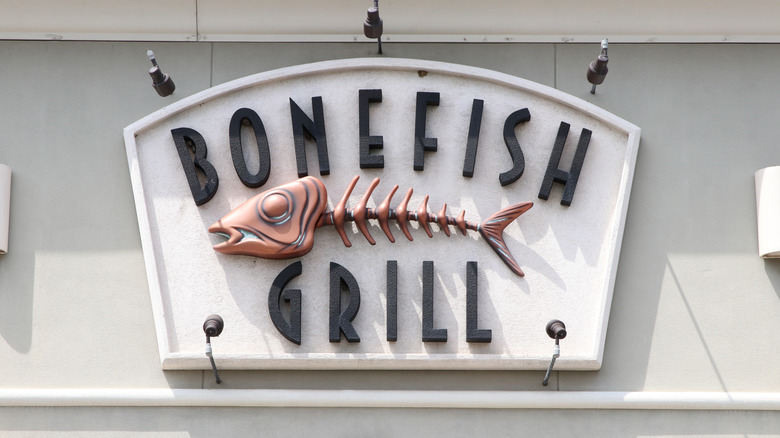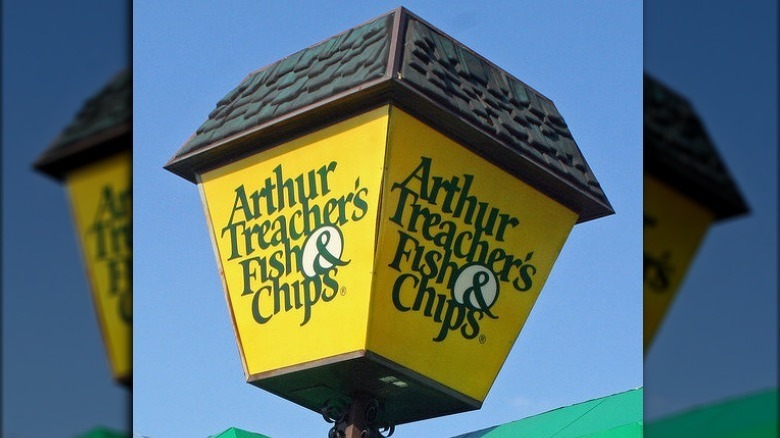Seafood Chains That Are Disappearing Across The Country
There's no gentle way to put it: It's tough being a seafood chain these days. If they weren't struggling before COVID-19 (and many were), the global pandemic created a perfect storm of lost revenue, labor shortages, and skyrocketing seafood prices that threw these restaurants off course and directly into troubled waters (via Smithsonian Magazine). When restaurant chains begin to suffer, it is only a matter of time before locations start closing their doors for good. That is precisely what's happening to seafood chains across the United States. In fact, as the Akron Beacon Journal reports, one such restaurant, Arthur Treacher's, can't even be called a chain anymore as only a single store remains open.
Whether they're local mainstays that have only a few years under their belts or nationwide chains that have been around for the better part of a century, seafood restaurants of all types have suffered lately. From relative newcomers like Bonefish Grill and the Lost Cajun to storied chains such as Red Lobster and Long John Silver's, here are some of the seafood chains that are disappearing across the country.
Long John Silver's
Founded in 1969, Long John Silver's has a storied history few seafood chains can match. Sadly, if things don't turn around quickly, that story may be coming to an abrupt end. The company's troubles can be traced all the way back to the 1980s, according to Eat This, Not That!. In 1989, Long John Silver's expanded to a record-high 1,500 locations. But that same year, the chain was purchased by a group of private investors in a bid to get a handle on its mounting debt burden. It's been nearly all bad news ever since. A small sampling of the restaurant's lowlights over the years includes filing for bankruptcy in 1998, getting hit with a branding lawsuit in 2010, and, as the cherry on top, having the Center for Science in the Public declare its "Big Catch" the worst restaurant meal in America.
All this has led to a precipitous drop in popularity and, in turn, the number of locations. QSR Magazine reports that the chain had 1,000 restaurants in 2015 but has shut down hundreds stores since then. Included among the casualties was Long John Silver's flagship restaurant in Louisville, which was shuttered in April, according to Louisville Business First. There are currently under 700 Long John Silver's locations in the country — less than half as many as in the chain's heyday.
Kona Grill
Few restaurant chains have had as tough a go of it lately as Kona Grill. Unlike many of its competitors, who can blame the COVID-19 for their troubles, Kona's downturn has been largely self-inflicted. According to Restaurant Business Online, in the four-year span from 2013 to 2017, the seafood chain doubled its location total from 23 to 46. Impressive, right? Not so much. The company admitted its rapid expansion was one of the main factors in its recent downfall. Each restaurant cost roughly $4 million to open, but in 2015 sales began to drop. With little available money on hand, Kona stopped opening new restaurants in 2017 and focused on reducing costs. This also proved to be unwise. Cutting staffing, marketing, and culinary improvements helped the company's bottom line in the short term but led to an overall drop in standards and, in turn, a further drop in revenue.
All of this culminated in the company filing for bankruptcy in 2019. At the same time, it announced the closings of 15 restaurants, dropping its total down to 27 locations. According to its website, Kona Grill is down to 24 stores at the time of this writing.
Joe's Crab Shack
Houston-based Joe's Crab Shack is another chain whose problems predate the COVID-19 pandemic. The seafood outlet's troubles can be traced back at least several years. In June 2017, parent company Ignite Restaurant Group filed for bankruptcy. "We have deployed many different operational strategies, but so far none have had a meaningful impact on sales or guest traffic," the company said in a statement at the time (via FSR Magazine). Apparently, the best operational strategy it came up with was to close dozens of restaurants because less than two months after the bankruptcy announcement came news Joe's Crab Shack had shuttered more than 40 locations.
FSR Magazine reported that there were 140 Joe's Crab Shack restaurants as recently as 2014. The mass closings left the company with 72 locations, with a former employee telling Consumerist at the time that Ignite "only wants 60 Joe's Crab Shack locations to remain open." A quick look at the restaurant's website, however, shows that there are fewer than 50 restaurants across just 18 states. Many of these states have just a single location, so any more closings could spell the complete disappearance of Joe's Crab Shack for wide swaths of the country.
McCormick & Schmick's
In 2011, seafood chain McCormick & Schmick's was purchased by Landry's Inc., owners of casual restaurants including Bubba Gump and Joe's Crab Shack. At the time of the purchase, Landry's CEO Tilman Fertitta said the struggling McCormick & Schmick's "fell victim to the need to grow and located some restaurants in secondary markets which were adversely impacted to a greater degree by the economic downturn" (via The Oregonian). He also made it clear that the chain would be closing locations. "There are some markets around the country we'd like to get out of," Fertitta stated. "We might end up at 90 restaurants one day, but I think that number has to go backwards first."
McCormick & Schmick's has a long way to go to get to 90 locations, and it's moving in the wrong direction. At the time Landry's became the owner, there were more than 80 restaurants across the country, according to SeafoodSource. At least three restaurants closed the very next year, however, and things have gotten even worse since. In 2017, Landry's turned off the lights in nearly one-third of its locations, Dayton.com reported. Then, in 2020, some of McCormick & Schmick's premier outposts, including one in San Diego's Omni Hotel and another in the Town Center section of Virginia Beach, were shut down. All these closings have left McCormick & Schmick's with under 30 restaurants to its name, per the company's website, less than one-third of what it had a decade ago.
The Lost Cajun
Roughly 15 years ago, former Louisiana fishing-lodge owner Raymond Griffin set out on a cross-country road trip with his wife after four hurricanes and the Deepwater Horizon oil spill led him to shut down his business (via Denver Business Journal). The couple was passing through Colorado when Griffin's wife injured her back. Not only did the injury require immediate surgery, it forced the pair to remain in Frisco, Colorado for months. While walking around town, Griffin devised the idea of opening a restaurant where he would bring his Cajun-style cooking to the Rocky Mountains.
The first Lost Cajun opened in 2010 and was an immediate success. So much so, Griffin opened a second location just two years later. The upward trajectory continued for years. In 2016, Griffin told the Denver Business Journal he expected to grow the business to 100 restaurants. But then, the Lost Cajun ran into a wall known as the COVID-19 pandemic. Like so many other chains, the company was forced to close locations and, in April 2021, filed for Chapter 11 bankruptcy. "A number of The Lost Cajun franchisees failed and those that remain open suffered significant revenue losses, with some indicating to the franchisor that closings are imminent," the company said in court documents, according to Restaurant Business Online.
However, they have started to turn things around. According to January 2022 press release from the company, the Lost Cajun did open four new locations during the pandemic, and have two more planned for early 2022.
Bubba Gump
The Academy Award-winning film "Forrest Gump" remains as highly regarded today as it was when it was released in 1994. The restaurant chain based on the movie, however, seems to be getting less popular by the year.
Inspired by the fictional shrimping company in the film, Bubba Gump Shrimp Co. has been serving southern-style seafood dishes for over two decades. Business was good for most of that time, allowing the chain to expand across the country, as well as overseas. Recent years have not been as kind. Bubba Gump has closed down restaurants every year since at least 2018. It started in Hawaii when the Kailua-Kona location was shuttered (via West Hawaii Today). Per Live 5 News, less than a year later, a Bubba Gump restaurant in Charleston shut its doors for good after nearly two decades in business. In 2020, the Bubba Gump at Chicago's Navy Pier bid us adieu and in 2021, another Hawaii location, this one in Maui, said goodbye. Today, Bubba Gump finds itself with just over 20 restaurants, according to its website.
Pappas Restaurants
Pappas Restaurants is a culinary empire consisting of several different restaurant concepts. Recently, that empire has had a few bricks fall out from its foundation. In June 2020, the Texas-based company announced it had closed five restaurants in its hometown of Houston (via Restaurant Business Online). These locations accounted for roughly 10% of the city's Pappas-owned stores. According to Culture Map, as with so many other chains, Pappas' struggles were brought on by the coronavirus pandemic. "Through this unbelievably trying time, our amazing team members have worked exceptionally hard, and we are so proud of each and every one of them," Pappas director of marketing Christina Pappas told the outlet.
Included amongst the closings were two Pappas Seafood House restaurants, leaving just three locations still standing. Also shuttered was the company's only Pappas Shrimp Shack restaurant, which had been open less than a year. The other seafood-based eatery to meet its demise was a Pappadeux Seafood Kitchen location. This is the company's one chain, however, that could likely afford to lose a restaurant. There are dozens of Pappadeux outposts across several states, including a number of locations still open in Houston.
Red Lobster
News of disappering Red Lobster restaurants isn't new. In fact, back in 2013, there were rumors the chain was shutting down for good and closing all 700-plus locations amid declining sales (via ABC News). That turned out to not be the case, but Red Lobster's future hasn't gotten any rosier in recent years.
In early 2020, credit rating agency Moody's downgraded Red Lobster's credit and predicted the restaurant would fair worse during the coronavirus pandemic than other chains, according to SeafoodSource. Low and behold, just a few months later CEO Kim Lopdrup admitted that the company was in the midst of "the most challenging time Red Lobster has faced in our 52 years of operation." At the same time, Joerg Ayrle, CFO of parent company Thai Union, told the Orlando Sentinel that the possibility of shuttering restaurants was real. "Maybe we'll lose some locations if landlords are really not understanding enough. That's fine, too," he said.
It appears he is a man of his word. While there were once more than 700 Red Lobster restaurants across the country, there are currently just 672 locations, according to ScrapeHero. With the pandemic still hampering restaurants, particularly those of the casual dining variety, it wouldn't be surprising to see that number continue to fall.
Legal Sea Foods
The Legal Sea Foods brand dates all the way back to 1950, but the last few years have not been as promising as the previous 60. In August of last year, the company permanently closed two of its 33 restaurants, one in Virginia, another in Washington, D.C. "The pandemic has forced us to look at what are the most appropriate locations to [re-open]. Some are surrounded by hotels and airports, which handicaps them," Legal Sea Foods then-president and CEO Roger Berkowitz told SeafoodSource at the time. "The universe of restaurants is going to be smaller. There are going to be fewer people choosing to eat out as regularly as they once did. It makes sense to look at having a smaller footprint."
Legal Sea Foods did more than just look at having a smaller footprint. According to Eat This, Not That!, by the end of 2020, the chain was down to 28 locations, meaning it had closed three additional restaurants in just four months. At its height in 2018, Legal Sea Foods had 35 outposts across multiple Northeastern states. As 2021 comes to a close, the seafood restaurant has just 23 locations to its name, with Massachusetts as the lone state with multiple stores.
However, the Legal Sea Foods Restaurant Group was purchased by PPX Hospitality Brands in December 2020, and a representative for the company tells Mashed, "in addition to the 23 locations in operation, two more (Kendal Square and Terminal E at Logan International airport) are reopening soon."
Bonefish Grill
Bonefish Grill, the market-fresh seafood chain owned by Outback Steakhouse parent company Bloomin' Brands, has been steadily closing locations for years. In 2016, Bloomin' announced it would be closing 14 underperforming Bonefish Grill restaurants within the next three years (via SeafoodSource). Before the year was out, three such locations already had their doors closed for good.
But it appears 14 was just a starting point. SeafoodSource reported that there were 210 Bonefish Grill restaurants in the United States in 2016. As of this writing, there are just 185, according to the restaurant's website. If recent news is an indicator, that number could drop even lower in the near future. In August of 2020, the S&P Global Market Intelligence predicted Bloomin' Brands had a 13.2% chance of defaulting on its loans. That was the second-highest among the country's largest public restaurant chains, behind only Dave & Buster's. Then, in late 2021, MarketWatch reported that the company's stock price fell 4% after its restaurants failed to hit sales goals. If recent history tells us anything, underperforming Bonefish Grill locations tend to find themselves on the chopping block.
Arthur Treacher's Fish & Chips
Depending on how old you are, you may have fond memories of the incredibly popular seafood chain known as Arthur Treacher's Fish & Chips, or you might have never even heard of it before. According to QSR Magazine, the restaurant, which was founded in 1969 and named after an English actor known for his roles in Shirley Temple movies, once counted 826 locations to its name. But a lot has changed since Arthur Treacher's heyday of the 1970s and 80s. In fact, the chain is now down to just one restaurant. In June, the location in Garfield Heights, Ohio shut down, Spectrum News reported, leaving the restaurant in nearby Cuyahoga Falls as the last remaining artifact of a former culinary dynasty. "When a customer walks [in] the door and you haven't seen them for years, and they're so excited that Arthur Treacher's is still here, still selling the fish, it just motivates me more to hang in here, just to see one day that someone's going to come in here and say, 'Come on, let's put this thing back together,'" restaurant investor Robert Allen said.
Fans of Arthur Treacher's may not be able to visit the restaurant anymore, but they can still enjoy its food. In June, Nathan's Famous announced a partnership to sell Arthur Treacher's fish and chips in a ghost kitchen concept (via Spectrum News).
